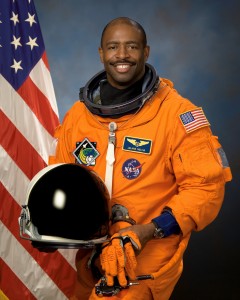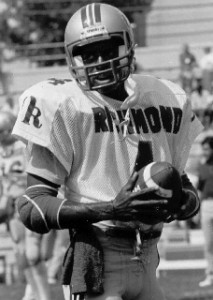Waiting For The Weekend: Awards and Astronauts
This week we look at the transition that has taken place in what voters consider important in selecting the Cy Young Award winner. We also look at a former star athlete who now is really shooting for the stars.
Remember When Wins Mattered For Starting Pitchers?
Zach Greinke’s distinction of sharing the record for the fewest number of wins by a Cy Young winning pitcher (16) didn’t last long as the record is now solely in the hands of Tim Lincecum (15).
In fact, it shows how times have changed to consider that the 31 total victories between the two 2009 Cy Young Award winners equals the total number of wins that Denny McLain registered when winning the American League Cy Young Award in 1968.
It used to be that the number one criteria for a starting pitcher being a serious Cy Young Award candidate was how many victories he recorded in a season. Sure, other factors like strikeouts, ERA and winning percentage have always been important, but the top prize for a pitcher usually was reserved for a hurler who either led the league or came close to leading the league in wins.
The voting for the 2009 Cy Young Awards clearly illustrates that is no longer the case.
Though Lincecom finished with one fewer victory than Greinke, he actually finished fourth in the National League in wins while Greinke’s total was good enough to tie for seventh in the AL.
[poll id=”26″]

What seems to have made Greinke and Lincecum appealing to voters was their performance in other categories.
Despite playing for the woeful Kansas City Royals, Greinke posted a 2.16 ERA, which is the lowest total in the American League since Pedro Martinez posted a 1.74 mark in 2000. He also finished second in the league with 242 strikeouts.
While Greinke’s selection was widely expected, Lincecum’s repeat as the National League winner was a slight surprise. Lincecum finished second in the NL with a 2.48 ERA. 2005 Cy Young Winner Chris Carpenter of the St. Louis Cardinals led the league with a 2.24 ERA and finished with a 17-4 record, compared to the 15-7 mark for Lincecum.
What seems to have given Lincecum an advantage over Carpenter and Adam Wainwright, who finished with a 19-8 record and 2.63 ERA was his strikeout total.
Lincecum registered a league best 261 K’s while Wainwright had 212 and Carpenter just 144.
The selection of Greinke and Lincecum as Cy Young winners seems to signal the completion of what has been a gradual reduction over the last decade of the value of victories as a measuring stick of greatness for starting pitchers.
In an era when most starters often pitch only six or seven innings, voters seem to now recognize that the victory total for a starting pitcher is largely out of his hands.
Greinke won 16 games, but very easily could have had many more wins. He allowed four or more earned runs in just five of his 33 starts during the season. He also pitched more than seven innings only 10 times with just three of those starts coming after the first of July.
Lincecum’s results were strikingly similar. He surrendered four or more runs five times in 32 starts and pitched more than seven innings 11 times.
I guess the selection of two pitchers with so few victories could be a one-year aberration, but I seriously doubt that to be the case. I think in the future we will end up with more Cy Young Award winners with 16 or fewer wins than we do with 20 or more victories.
Leland Melvin: Taking “Go Long” To Another Level

Former college football star Leland Melvin is currently in outer space aboard Space Shuttle Atlantis.
You may not have noticed that one of the astronauts currently flying aboard Space Shuttle Atlantis is a former college football star.
Having grown up in Virginia and being a student at James Madison University at the same time that Leland Melvin was a star wide receiver for the University of Richmond, I immediately recognized his name when I saw a list of the astronauts on the current mission.
In fact, this is actually the second mission for Melvin as he previously traveled aboard Atlantis to the International Space Station in February 2008.
A two-time honorable mention Division I-AA All-American, Melvin still holds the University of Richmond career records with 198 receptions and 2,669 yards. In 1985 he caught 65 passes for 956 yards and eight touchdowns.
Following graduation, the Detroit Lions selected Melvin in the 11th round of the 1986 NFL Draft. However, he never played a regular season down in the NFL as a hamstring injury led to his release by the Lions. He also had tryouts with the Dallas Cowboys and in the Canadian Football League with the Toronto Argonauts.

Melvin still holds several receiving records at the University of Richmond.
Undaunted following his brief foray into professional football, Melvin began moving down a path that would eventually have him shooting for greater stars than those in the NFL. He earned a Master of Science degree in Materials Science Engineering from the University of Virginia.
Melvin began working in Nondestructive Evaluation Sciences Branch at NASA Langley Research Center in 1989. He became an Astronaut in 1998 and 10 years later made his first trip into outer space.
No word if Melvin took a football with him on his second trip this week, but playing catch in outer space would certainly take football to another level.
Birthdays
Each week we look at some current and former athletes who were born during the week.
Here are some notable sports figures born during this week:
November 20 – Kenesaw Mountain Landis (1866), Clark Griffith (1969), Mark Gastineau (1956), Dominique Dawes (1976)
November 21 – Sid Luckman (1916), Stan Musial (1920), Jim Ringo (1932), Earl “The Pearl” Monroe (1944), Bruce Laird (1950), Troy Aikman (1966), Michael Strahan (1971)
November 22 – Lew Burdette (1926), Billie Jean King (1943), Greg Luzinski (1950), Lyman Bostock (1950), Eric Allen (1965)
November 23 – Jack McKeon (1930), Luis Tiant (1940), Brook Jacoby (1959)
November 24 – Joe “Ducky” Medwick (1921), Oscar Robertson (1938), Paul Tagliabue (1940)
November 25 – Lenny Moore (1933), Bucky Dent (1951), Bernie Kosar (1963), Cris Carter (1965)
November 26 – Lefty Gomez (1908), Jeff Torborg (1941), Jan Stenerud (1943), Larry Gura (1947), Richie Hebner (1947), Harold Reynolds (1960), Shawn Kemp (1969)
